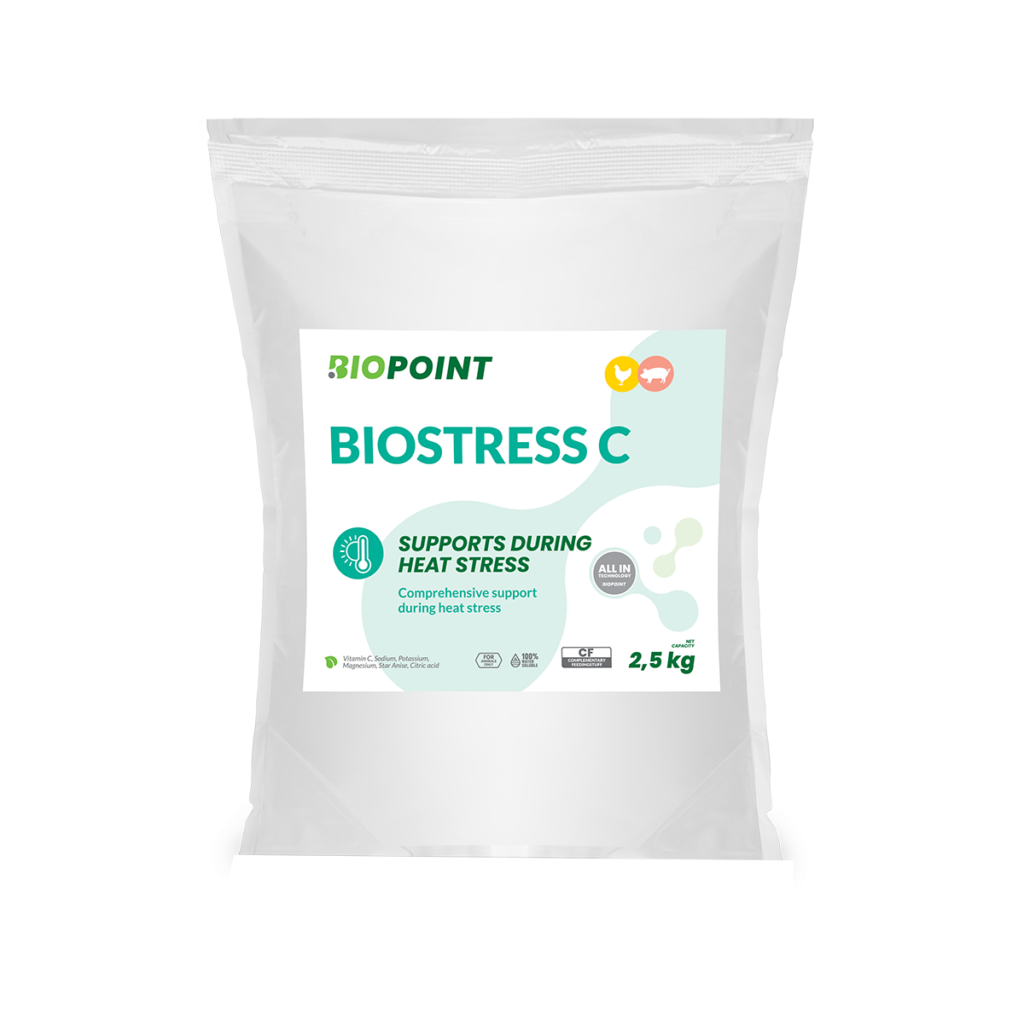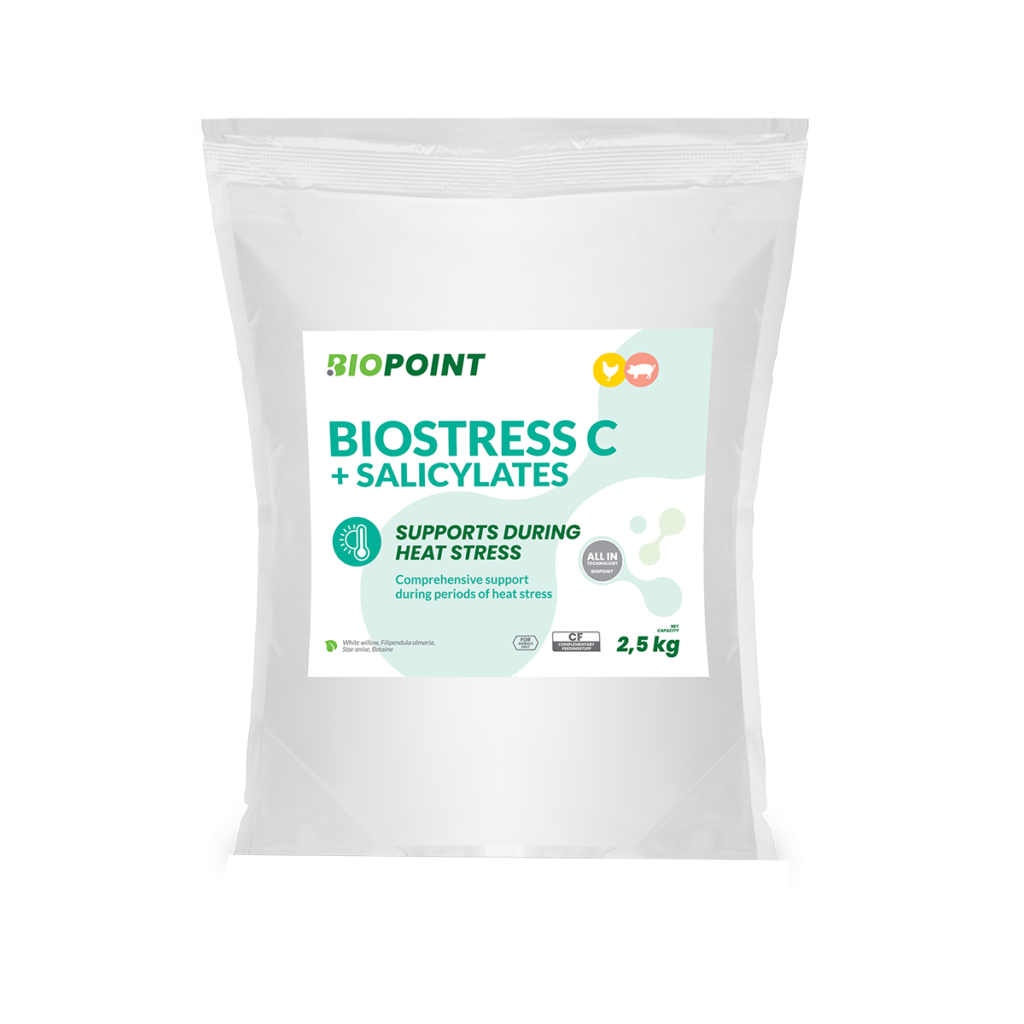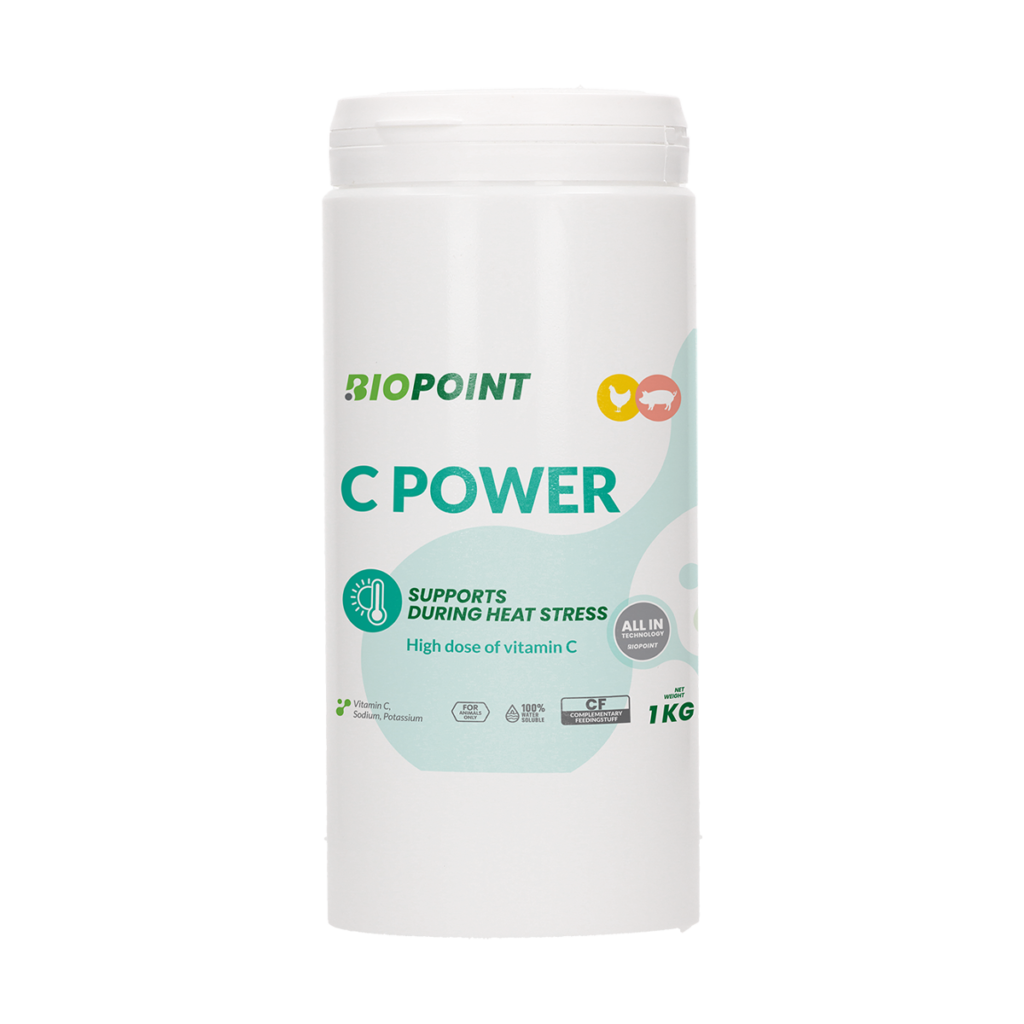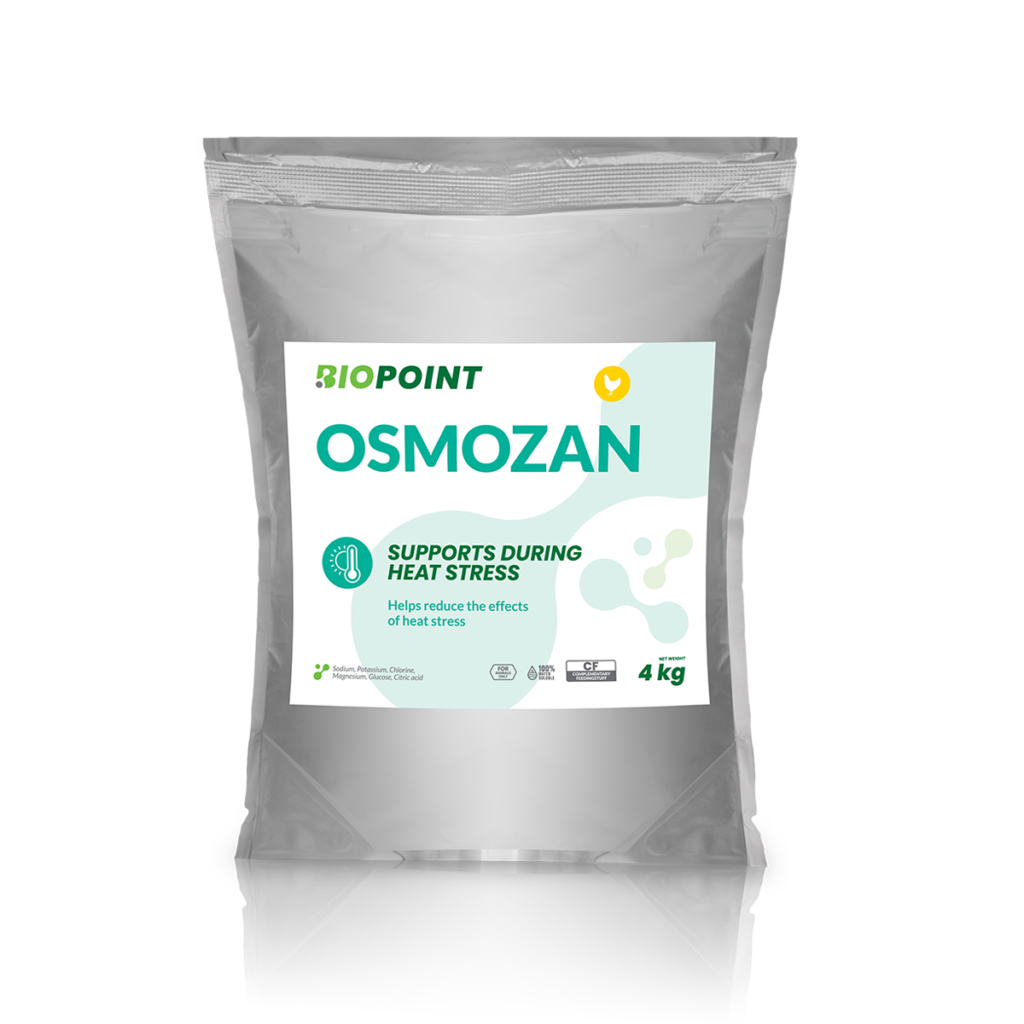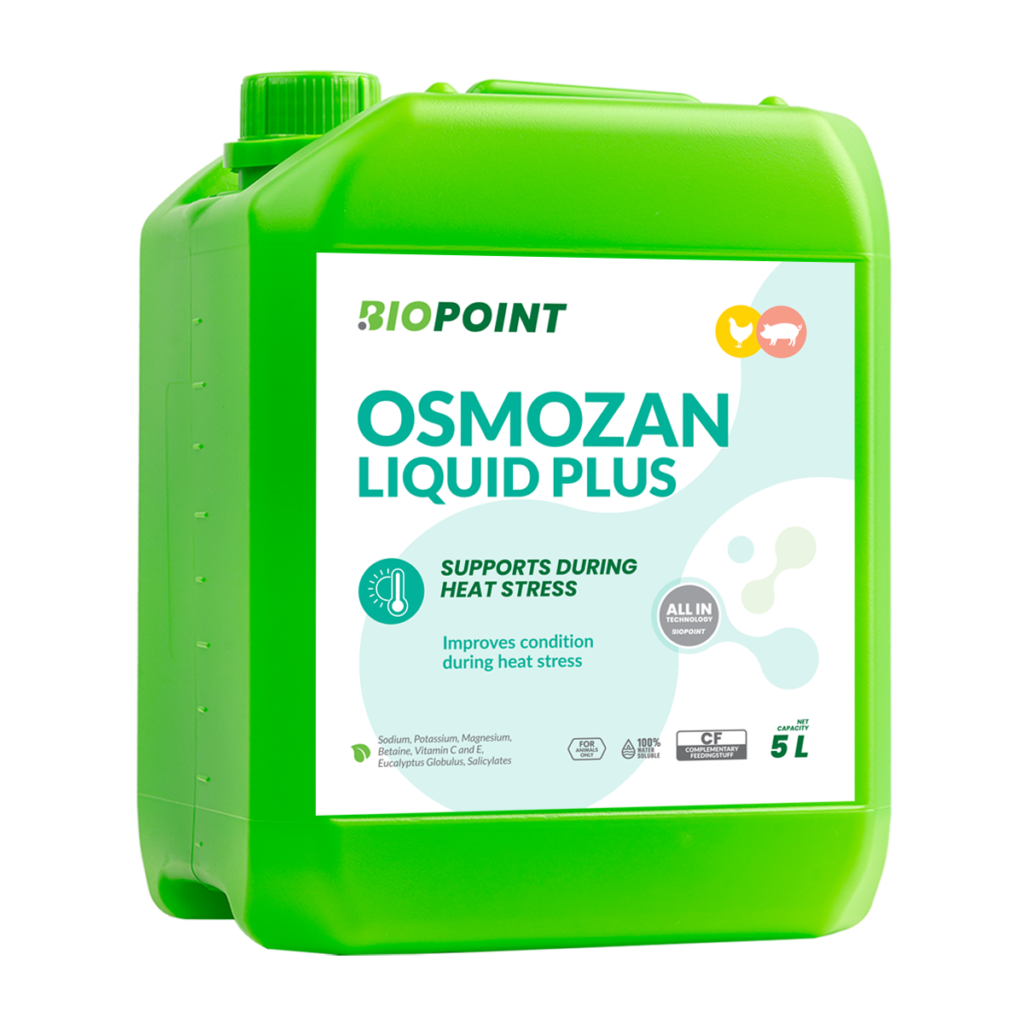BIOSTRESS C
OSMOZAN
OSMOZAN LIQUID PLUS
Ask about the product
BioPoint - support for pigs during heat stress
Heat stress is a critical challenge in swine production, significantly affecting animal welfare, productivity, and farm profitability. As global temperatures rise, the incidence of heat stress is increasing, making effective management strategies essential for sustainable livestock operations. This article explores the fundamental aspects of heat stress in swine, highlights effective preventive measures, and introduces advanced nutritional and environmental management practices to help mitigate these effects. By integrating these practices, farmers can protect their livestock from the detrimental impacts of heat stress, ensuring optimal health and productivity.
Understanding Heat Stress in Swine: The Basics
Heat stress occurs in swine when their body temperature exceeds the normal range, and they are unable to effectively dissipate heat. This physiological stress response can be triggered by high ambient temperatures, humidity, or direct sunlight, which overwhelms the animal's thermoregulatory mechanisms. Swine are particularly susceptible to heat stress due to their limited sweat glands, which makes heat dissipation primarily reliant on respiration. Understanding these basic mechanisms is crucial for developing effective strategies to manage heat stress in pig farming.
What is Heat Stress?
Heat stress in swine is a condition where pigs are unable to maintain their thermal balance due to environmental heat loads exceeding their capacity to lose heat. This imbalance can lead to hyperthermia, which disrupts normal cellular function and can impair animal performance. The physiology of swine makes them particularly vulnerable to heat stress, as they lack effective cooling mechanisms like sweating. Instead, they rely heavily on panting and surface cooling, which can be insufficient under extreme conditions.
Common Symptoms of Heat Stress
The symptoms of heat stress in swine are varied but generally include increased respiration rate, excessive salivation, lethargy, and a reduced feed intake. These symptoms can escalate to more severe conditions such as heat exhaustion and heatstroke if not promptly managed. Early recognition of these signs is crucial for timely intervention and to prevent long-term health issues and productivity losses.
Preventive Strategies to Combat Heat Stress
Effective management of heat stress begins with preventive strategies that focus on modifying the environment to reduce heat load and improve animal comfort. These strategies are vital in maintaining productivity and ensuring the welfare of the swine during hot weather.
Effective Cooling Systems
Implementing cooling systems such as sprinklers, misters, and cooling mats in swine barns plays a pivotal role in alleviating heat stress. These systems help to lower the temperature and increase the evaporative cooling on the skin of the pigs. It's important to design these systems to ensure they meet the specific needs of the swine at different growth stages and to maintain them regularly for optimal performance.
Optimizing Ventilation
Proper ventilation is crucial in swine housing to remove excess heat and provide fresh air, helping to prevent the buildup of humidity and ambient heat. Designing barns with adequate ventilation systems, including fans and natural airflow, can significantly reduce the thermal stress on pigs. The positioning of inlets and outlets, along with automated climate control systems, can help maintain a consistent environment that supports the animals’ thermoregulatory capacity.
Nutritional Support for Swine During Heat Waves
Proper nutrition plays a crucial role in helping swine cope with heat stress. Adjusting the diet to include specific nutrients that support thermoregulation and overall health can significantly mitigate the adverse effects of high temperatures. This section delves into the importance of dietary adjustments and the role of specific supplements in enhancing the resilience of swine during heat waves.
Role of Electrolytes and Antioxidants
Electrolytes such as sodium, potassium, and chloride are vital for maintaining fluid balance and normal cellular function, which can be disrupted during periods of heat stress. Supplementing swine diets with electrolytes helps to replace those lost through increased respiration and salivation, thereby maintaining hydration and preventing dehydration. Antioxidants, on the other hand, combat oxidative stress that can occur due to the increased metabolic rate during heat exposure. Including antioxidants in the diet, such as vitamin E and selenium, can help protect cells from damage and support immune function.
Dietary Adjustments
Adjusting the composition of swine feed to enhance digestibility and reduce metabolic heat production is another effective strategy. This can involve increasing the energy density of the diet by adding fats, which produce less metabolic heat compared to carbohydrates. Additionally, incorporating easily digestible protein sources and reducing the overall crude protein content can decrease the heat increment from digestion. Providing frequent, smaller meals can also help manage heat load by preventing large metabolic spikes.
Enhancing Gastrointestinal and Respiratory Health
Maintaining the health of the gastrointestinal and respiratory systems is essential for swine under heat stress, as these systems play key roles in nutrient absorption and thermoregulation. Supporting these systems through targeted dietary strategies can improve the overall resilience of swine to heat stress.
Supporting Digestive Health
Heat stress can negatively impact digestive efficiency, leading to reduced nutrient absorption and gut health issues. Including fiber sources that promote gut motility and health, along with prebiotics and probiotics, can help maintain a balanced gut microbiota and enhance nutrient utilization. Ensuring that feed is of high quality and free from contaminants is also crucial during periods of heat stress, as any additional health burden can exacerbate the effects of high temperatures.
Respiratory Function and Heat Stress
The respiratory system is directly involved in the thermoregulatory process through panting, which helps dissipate excess heat. Supporting respiratory health through environmental management, such as reducing dust and ammonia levels, is essential. Additionally, dietary supplements that support respiratory function, such as vitamins and minerals that enhance immune response, can help maintain effective thermoregulation and overall health.
Implementing Comprehensive Heat Stress Management
Effective management of heat stress requires a holistic approach that combines environmental control, nutritional strategies, and regular monitoring. This comprehensive strategy ensures that all aspects of the pigs’ environment and care are optimized to minimize the adverse effects of high temperatures.
Environmental Control Measures
Creating an optimal environment for swine during hot weather involves several key strategies. Ensuring that housing facilities are designed to maximize natural ventilation and minimize heat accumulation is fundamental. This can include the use of reflective roofing materials, insulation, and strategically placed shade structures. Additionally, implementing cooling systems such as evaporative coolers, fans, and water sprinklers can significantly reduce the temperature within pig barns. Maintaining a clean environment to reduce heat-contributing factors like dust and ammonia is also crucial. Regular maintenance and monitoring of these systems ensure they operate effectively, providing consistent relief from heat stress.
Integrating BioPoint Feed Additives
BioPoint’s range of feed additives can play a crucial role in supporting swine during periods of heat stress. These additives are designed to enhance the resilience of pigs by providing essential nutrients that support hydration, antioxidant defenses, and overall health. Products that include electrolytes help maintain fluid balance and prevent dehydration, while those enriched with antioxidants protect against oxidative damage. Additionally, BioPoint offers specific formulations that improve gut health and support the immune system, which are vital under stress conditions. Incorporating these additives into regular feed regimens can help swine better cope with the challenges of high temperatures, maintaining their productivity and well-being.
Monitoring and Adapting to Climatic Extremes
Adapting to changing climatic conditions is an ongoing process that requires constant vigilance and flexibility in management practices. This section outlines strategies for monitoring environmental conditions and adjusting farm practices to ensure swine welfare during extreme weather events.
Adapting Farm Practices to Weather Extremes
Farmers must be prepared to adjust their management practices in response to weather forecasts and observed conditions. This can include altering feeding times to cooler parts of the day, increasing the frequency of water supply checks, and adjusting ventilation settings to respond to temperature changes. Providing additional shade and ensuring that pigs have access to wallows or misting systems during peak heat periods can also be effective. Training staff to recognize early signs of heat stress and implement emergency measures promptly is vital for preventing severe health issues.
Continuous Monitoring and Feedback
Regular monitoring of environmental conditions within pig housing is essential for effective heat stress management. Using temperature and humidity sensors to track conditions in real-time allows for timely adjustments to ventilation and cooling systems. Additionally, monitoring the health and behavior of the pigs provides valuable feedback on the effectiveness of the implemented strategies. Recording data on temperature, humidity, feed intake, and health indicators can help identify trends and inform future management decisions. Implementing a feedback loop where data is continuously reviewed and management practices are adjusted accordingly ensures that the farm remains adaptable to changing conditions.
Summary
Managing heat stress in swine is a complex but critical aspect of modern pig farming. By understanding the physiological impacts of heat stress and implementing a combination of environmental controls, nutritional strategies, and continuous monitoring, farmers can significantly mitigate its adverse effects. BioPoint’s feed additives offer valuable support by enhancing the pigs’ ability to cope with high temperatures, ensuring their health and productivity. Through proactive management and the adoption of comprehensive strategies, swine producers can protect their herds from the detrimental impacts of heat stress, maintaining animal welfare and farm profitability even in challenging climatic conditions.
